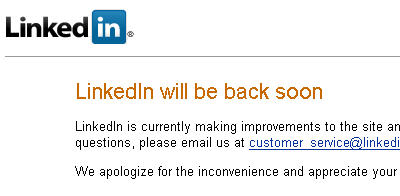LinkedIn down: Proof that 'the offline problem' needs solving


Here's another reason I'd like to see the offline problem solved sooner than later and solved with a technology like JavaDB (Apache Derby) or Flash that can be implemented in thick or thin (well, OK, rich) clients. It doesn't matter what the reasons for going down are (if it were a planned outage, it would have been nice if I was warned with an email). The fact that LinkedIn.com was down yesterday is proof that whether the world continues to stay with its largely thick-client architecture or if it moves to something a bit thinner -- perhaps a largely browser-based system that's glorified with Java and Flash -- it still needs a way to continue to work when the services that it's used to reaching become unreachable.
I recevied this notice yesterday after attempting to accept an invitation that I received via email. The fact that LInkedIn was down really isn't big news to me. I don't necessarily consider it to be a mission critical application that I can't do without. But, as I said yesterday, the people who keep saying that thin isn't in seem to be in denial about the number of people that are taking delivery of an increasing percentage of their application functionality through a browser. At what point will we wake up one day and ask ourselves "So, why do I need all this expensive horsepower on my desktop to run a browser?"
This said, I do agree with one issue that was raised by one ZDNet reader who dragged the government into the conversation. The big question being who do you trust to protect your data from the government's prying eyes: yourself or your ASPs?